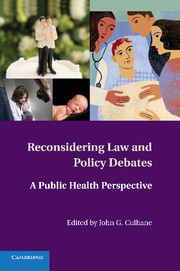Book contents
- Frontmatter
- Contents
- Contributors
- Introduction
- Part I Birth and Death
- 1 Beyond Privacy: A Population Approach to Reproductive Rights
- 2 Stretching the Boundaries of Public Health: Should We Consider End-of-Life Care a Public Health Issue?
- Part II The Limits of Civil Rights
- Part III Dimensions of Violence
- Part IV Beyond Compensation: Public Features of Private Litigation
- Index
- References
2 - Stretching the Boundaries of Public Health: Should We Consider End-of-Life Care a Public Health Issue?
Published online by Cambridge University Press: 06 December 2010
- Frontmatter
- Contents
- Contributors
- Introduction
- Part I Birth and Death
- 1 Beyond Privacy: A Population Approach to Reproductive Rights
- 2 Stretching the Boundaries of Public Health: Should We Consider End-of-Life Care a Public Health Issue?
- Part II The Limits of Civil Rights
- Part III Dimensions of Violence
- Part IV Beyond Compensation: Public Features of Private Litigation
- Index
- References
Summary
INTRODUCTION
The nature of dying today differs markedly from dying 100 or even 60 years ago, and the debates surrounding end of life care – for example, when to stop life-sustaining treatment of a terminally ill patient – are unquestionably a product of the modern era of dying. During the nineteenth century, dying and care of the dying moved from the sphere of religion to that of medicine. Some have termed the evolution as “art to technique,” wherein the art of death refers to dying as a public or community event and technique to the modern institutions and machinery of dying. In the 1800s, death for most took place in the presence of “immediate relatives, the physician, … the local preacher, … [and] friends and relatives.” The priest or minister and the doctor both played significant roles – one administering to spiritual pain, the other to its physical counterpart. Over the next 200 years, the role of the physician expanded and that of the religious counselor diminished, resulting in the “medicalization” of death.
Prior to the 1950s, there were few controversies regarding end of life care simply because medical technology had not reached a point where it could extend life considerably for terminally ill patients. As a result, most people died at home, outside of hospitals or other health care institutions. Today, over 80 percent of individuals die in health care institutions.
- Type
- Chapter
- Information
- Reconsidering Law and Policy DebatesA Public Health Perspective, pp. 40 - 66Publisher: Cambridge University PressPrint publication year: 2010
References
- 1
- Cited by



